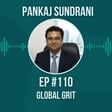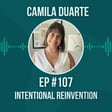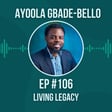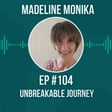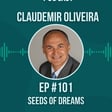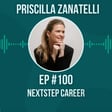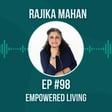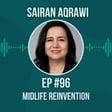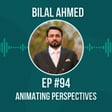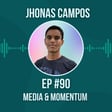Become a Creator today!Start creating today - Share your story with the world!
Start for free
00:00:00
00:00:01

#69 Global Navigator w/ Kasia Gurgul
Kasia is an avid explorer of ideas & cultures. As a professional executive coach, author and founder of Mindquest Global Leadership Development, Kasia works with founders who are ready to scale globally, as well as busy leaders at global companies, including Amazon, Cisco, LinkedIn, Salesforce, Samsung, HSBC and Visa.
She loves equipping leaders with modern leadership skills so they can expand their impact, escape the time trap & get their life back, without giving up on leadership.
Recommended
Transcript
Introduction to Find A Way Podcast
00:00:02
Speaker
Welcome to the Find A Way podcast, where we celebrate the remarkable journeys of immigrant entrepreneurs who have founded startups in North America.
00:00:12
Speaker
And we are your hosts, Beatriz Anatelli and Ingrid Polini.
00:00:17
Speaker
Join us as we dive deep into the personal stories of these inspiring individuals, exploring their challenges, triumphs, and the diverse range of innovative companies they have built.
Guest Introduction: Kasia Gurgu
00:00:33
Speaker
This is episode number 69, Global Navigator.
00:00:36
Speaker
Today, our guest is Kasia Gurgu.
00:00:38
Speaker
Kasia is an avid explorer of ideas and cultures.
Kasia's Work with Global Leaders
00:00:42
Speaker
As a professional executive coach, author, and founder of MindQuest Global Leadership Development, Kasia works with founders who are ready to scale globally, as well as busy leaders at global companies, including Amazon, Cisco, LinkedIn, Salesforce, Samsung, HSBC, and Visa.
00:00:57
Speaker
She loves equipping leaders with modern leadership skills so they can expand their impact, escape the time trap and get their life back without giving up on leadership.
00:01:05
Speaker
Welcome, Kasia.
00:01:07
Speaker
Thank you.
00:01:08
Speaker
So great to be here with you this morning.
00:01:12
Speaker
I'll say that like everything that you said you help leaders with are things that entrepreneurs need like a thousand of the time.
00:01:19
Speaker
So I would love before we talk about your personal journey, can you tell us more about your business and like what you help those leaders accomplish in general?
Leadership Clarity and Prioritization
00:01:30
Speaker
Yeah, you know, I think that the biggest thing right now that I see is the need for leaders to make space to actually be able to think clearly because of the busy culture that we are often embedded in.
00:01:44
Speaker
It can be, you know, as entrepreneurs, it's even harder sometimes to make that space because there are always so many things to do.
00:01:53
Speaker
So that's really the starting point that, you know, with our clients, we create that space to consider what really matters the most, to prioritize and to look at what can they shift in how they behave and what they do to really help them free up time and to get better results, you know, through their communication.
00:02:17
Speaker
Because often when we have speed as well,
00:02:21
Speaker
we can lose things along the way and that clarity can be lost and that is a really important aspect of actually being able to achieve the outcomes that we want to achieve.
00:02:37
Speaker
these are the key things that we focus on is getting that clarity and then looking at what really needs to happen, what needs to change and taking one step at a time to make those changes play out and support people to develop their talents.
00:02:53
Speaker
Because I think that's often too overlooked, you know,
00:02:58
Speaker
Companies will hire talent, look for the best talent, but then not really do much later to help people develop.
00:03:05
Speaker
And that's really why I started doing what I'm doing.
00:03:09
Speaker
I saw the opportunities to really enable leaders to have more support, to be better at what they do.
00:03:18
Speaker
And then they can then enable those people around them to be their best.
00:03:27
Speaker
That's amazing and very beautiful.
00:03:29
Speaker
I personally think that's a really strong pillar, a great pillar for any entrepreneur and leaders in any position.
00:03:36
Speaker
So they need to be in there with their skill set aligned with what they're doing and have that space for that, you know, that safe space to.
00:03:45
Speaker
explore and work on it.
00:03:48
Speaker
So thank you for doing that to all these amazing entrepreneurs around the globe.
Immigration and Leadership Perspective
00:03:53
Speaker
Kasia, we know you've had an incredible journey immigrating twice and living in multiple countries.
00:03:58
Speaker
Can you share more about that and tell how these experiences shaped your perspective on leadership and business?
00:04:04
Speaker
Kasia Moukata- Sure.
00:04:07
Speaker
Well, you know, it's a huge question.
00:04:13
Speaker
Definitely, you know, the fact that I grew up in Poland, Canada, and then later spent, you know, 15 years of my life have shaped my business because I feel that I'm able to adapt easily to working with people in different cultures.
00:04:32
Speaker
And, you know, it really drove the curiosity and,
00:04:38
Speaker
I think that's a big part of my work is the curiosity to really get to know people on a deeper level.
00:04:46
Speaker
And that then allows us to spot opportunities that are perhaps unique for that environment, that company, that leader.
00:04:58
Speaker
that would be, I'd say, the biggest, most important thing, that all these moves had to ignite the curiosity, right?
00:05:07
Speaker
There was no other way to get to know a place.
00:05:10
Speaker
And it really started to get me more and more curious about the world and the way that we see things.
00:05:17
Speaker
And perspective is such an important part of
00:05:21
Speaker
experiencing different cultures and also being able to work globally.
00:05:28
Speaker
The really interesting way that someone in Asia might view business or might view their day-to-day life compared to someone in Europe or North America, it's fascinating.
00:05:44
Speaker
And I think it really opens up a lot of opportunity to understand that we can actually change things
00:05:50
Speaker
if they don't work for us, you know, if we're under a huge amount of pressure to be a certain way because of a cultural, you know, framework, then that frees us up to be able to be who we really want to be and what works for us.
00:06:07
Speaker
So it's an interesting journey to witness those personal changes that people undergo as they let go of certain, you know,
00:06:18
Speaker
pressures and sort of come into more of being who they who they want to be and who they can be because letting go of that pressure allows them to have a lot more impact and to to think more freely about what they want to do in this world.
00:06:40
Speaker
Um, I love what you just said, because I think it's such an important message.
Cultural Identity and Assimilation Pressures
00:06:44
Speaker
We talked about it in a couple of episodes ago in terms of assimilation, right?
00:06:48
Speaker
Because when you move to a new country, or you might be moving to a new country for a new job, for example, a lot of people tell you to just assimilate, and then these people end up losing themselves in the mix.
00:06:58
Speaker
And it's not that
00:06:59
Speaker
you have to learn about the culture and learn how like the cultural norms work, especially like business norms and all that, but bringing in the aspects of your culture and what makes you so great in what you're doing respectfully, of course, and not just assimilating into like fitting exactly in because, and the added pressure to perform,
00:07:21
Speaker
And that's something that we see with immigrant founders often ends up putting them in that box and then really trying to fit in, into that, like small box into like, look at like doing things in a very specific way.
00:07:33
Speaker
Um,
00:07:34
Speaker
Talking about culture.
00:07:36
Speaker
So when we were writing your script, I know that you mentioned that you had to shed cultural, like fear driven family beliefs to believe in yourself and thrive.
00:07:46
Speaker
And I think this is a huge thing.
00:07:49
Speaker
I think that like, you know, people that come from countries such as ours, like Brazil, or like we talk from people that come from India, Pakistan, so many other countries, that the cultures that they grew up with was
00:07:59
Speaker
sometimes a fear culture in terms of like stability, uh, economic stability.
00:08:04
Speaker
Right.
00:08:04
Speaker
And like, we have to do things in search of like, you either become a doctor or an engineer, um, like business or like very specific.
00:08:11
Speaker
So how do you help your clients also do the same that you did in terms of shedding that like fear driven, you know, mindset and what advice would you have for others who may be facing similar challenges?
Overcoming Fears and Taking Action
00:08:26
Speaker
Yeah.
00:08:27
Speaker
Well, and you know, I think, um,
00:08:30
Speaker
It also depends on if it's just in our own mindset and whether we're still surrounded by that in terms of family and their own fears for us, right?
00:08:41
Speaker
Because that can add a lot more
00:08:45
Speaker
complexity.
00:08:47
Speaker
In terms of, you know, working together one on one, I think it's about really identifying what are those fears and exploring what is truly possible.
00:08:58
Speaker
I think there's no better way of proving our fears wrong than just taking action and seeing the results, right?
00:09:07
Speaker
Because then there's nothing that you can question about that fear
00:09:14
Speaker
it doesn't matter anymore.
00:09:16
Speaker
It becomes irrelevant and we can just continue onwards, right?
00:09:21
Speaker
So it's about seeing what it is and taking action one step at a time, not getting overwhelmed by, you know, having to do too many things.
00:09:33
Speaker
I think it's just putting one foot in front of the other and seeing what's possible, right?
00:09:38
Speaker
Because we really don't know what's possible until we try, try things.
00:09:45
Speaker
Give me an example just so we can support.
00:09:48
Speaker
So let's say one thing that we hear often is in terms of that family aspect, right?
00:09:54
Speaker
When entrepreneurs want to start with their business, they feel a lot of pressure from the family for the financial instability as an entrepreneur that's full of ups and downs.
00:10:04
Speaker
So what would you say...
00:10:06
Speaker
if an entrepreneur comes to you, he's like, look, I have a lot of fear that this is not going to work out.
00:10:10
Speaker
They're like, you know, that, um, what if I can't make enough money?
00:10:13
Speaker
What if I have to go back to my other job?
00:10:15
Speaker
Like what, what were some of the things that you would tell them to work, uh, in?
00:10:22
Speaker
Um, well, you know, I think that it's really dependent on that person's values.
00:10:29
Speaker
Right.
00:10:29
Speaker
Because if their values are complete financial stability, well, then we would look at, OK, well, how is that actually possible?
00:10:37
Speaker
Is that possible in today's environment?
00:10:41
Speaker
And, you know, I think a lot of the time there's a misunderstanding or.
00:10:47
Speaker
You know, perhaps in the older environment we are in, corporate jobs were viewed as stable, right?
00:10:52
Speaker
Well, that's certainly not the case anymore.
00:10:55
Speaker
And global companies go through many, many restructures and adjust their resources to be able to meet the current environment because it's changing much faster, right?
00:11:09
Speaker
And it's a lot more ambiguous than it used to be.
00:11:13
Speaker
So I think, you know, looking at what is the reality and how correct are these assumptions that we have that run our fears is really important.
00:11:26
Speaker
So, yes, while it's risky starting a new venture, it's also risky having a corporate job that you've held for the last 25 years.
00:11:34
Speaker
Yeah.
00:11:37
Speaker
And in fact, I'd say that's even more risky, right?
00:11:40
Speaker
Because you can adapt to a very stable environment and then you're not used to changing and learning quickly.
00:11:47
Speaker
And I think being able to learn fast, adapt, experiment are all very important things, qualities that we need to cultivate and become used to in our current environment to be able to be stable ourselves versus counting on
00:12:06
Speaker
what's outside of us to be stable.
Pandemic Challenges in Remote Work
00:12:09
Speaker
Does that make sense as I share that?
00:12:12
Speaker
It does, it does.
00:12:14
Speaker
And talking, getting the lead on that, talking about stability, one event that has, that took us all, you know,
00:12:25
Speaker
by surprise, which was the pandemic.
00:12:28
Speaker
So I know that during the pandemic, you were very busy supporting clients as they were navigating their lives, both personally and professionally.
00:12:37
Speaker
Can you share some of the challenges that you faced and how you also helped your clients overcome them?
00:12:45
Speaker
The challenges that I personally was facing?
00:12:49
Speaker
And the ones that you also, yeah.
00:12:51
Speaker
Yeah.
00:12:52
Speaker
And also the clients as well.
00:12:53
Speaker
Well, for me personally, I think the biggest challenge was that I was actually quite isolated before the pandemic started because I moved from Australia to Canada when my mother got breast cancer.
00:13:05
Speaker
So we had just gone through my mother's, you know, surgery, chemo, radiation treatments.
00:13:14
Speaker
the fall before the pandemic started.
00:13:17
Speaker
And being back in Victoria after over 15 years and not being able to see anyone or meet anyone was quite tough.
00:13:29
Speaker
And for me, the sense of purpose that I felt from my work was the thing that really got me through.
00:13:37
Speaker
and my daily walks, doing yoga in the park.
00:13:42
Speaker
And I was actually dancing, putting my favorite music on and dancing next to my desk.
00:13:49
Speaker
So these are my personal strategies, which I had.
00:13:53
Speaker
And
00:13:56
Speaker
I also encouraged a lot of my clients to try these things out as well.
00:14:02
Speaker
In fact, one of my clients had told me that him and his partner were really having a rough time because they were working remotely together.
00:14:09
Speaker
And they tried dancing, and it really helped them to improve their relationship, to have a bit of fun, to move a bit, and just change the energy.
00:14:21
Speaker
And that's the important thing.
00:14:26
Speaker
you know, everyone was struggling to adapt at the beginning.
00:14:29
Speaker
And certainly some of the leaders I was working with at global companies, especially, you know, older leaders who hadn't ever really led remotely, were trying to get their head around how to do this and how feasible it was going to be for them to be able to communicate and get their message out.
00:14:54
Speaker
So those were
00:14:56
Speaker
some of the things that we were having conversations about and being able to negotiate as well, because some countries were already working from home, other countries were still going into the office.
00:15:12
Speaker
And there were all kinds of different scenarios happening at the same time.
00:15:17
Speaker
So I had clients who didn't want to go into the office anymore, but were still being asked to go into the office.
00:15:23
Speaker
and you know having having to to negotiate having to have these tough conversations um to to be able to you know do what they felt that was the right thing for them um i appreciate you sharing that because i think it's a
00:15:45
Speaker
common experience that a lot of immigrants that moved to Canada around, um, around that time I am, uh, but like, also you were dealing with, you know, I move after living 15 years away from the country that you grew up in, um, dealing with, uh, family health challenges that thankfully I know that like your mom is doing better now and we, we keep in touch often me and you, but yeah.
00:16:09
Speaker
But like, you know, having to deal with that and like that loneliness that comes and settles and,
00:16:14
Speaker
And especially during the pandemic, when you can't even even if you want to make an effort to meet people, you can't, right?
00:16:22
Speaker
I want to switch gears a little bit, because I think it's an important, I believe, from what you told me, and correct me if I'm wrong, it was a bit of a pivotal moment for you to get to think about the job that you're doing today.
00:16:35
Speaker
which is back in the day you've worked in medical research and led digital transformation programs across Asia and the Pacific for Roche products.
00:16:44
Speaker
And how has that experience influenced your approach to leadership
Medical Research and Digital Transformation
00:16:47
Speaker
in business?
00:16:47
Speaker
Like some of the lessons that you learned and how like it kind of helped you see the problems that you help those leaders solve today.
00:16:55
Speaker
So I'd love to talk a little bit about that.
00:16:57
Speaker
Yeah, for me, that had a huge impact on how I could see what opportunities existed for leaders.
00:17:09
Speaker
You know, the biggest thing was investing in building relationships because really I see a lot of focus on the work, the tasks, right, that people need to do.
00:17:24
Speaker
And so in conversations,
00:17:28
Speaker
Most of the time, these are project-related, work-related conversations.
00:17:34
Speaker
And I feel that not enough time was taken to really get interested in the person to understand what are their strengths, what are their aspirations, desires for their career, for their life.
00:17:50
Speaker
And taking that big-picture approach to relationships is
00:17:57
Speaker
an important part of them being able to create alignment in terms of strengths versus what tasks that person is doing to align motivations, to understand what support that person might need and really to build that trust and, you know, interest in
00:18:19
Speaker
in both directions to interact on a regular basis, to actually enjoy the relationship, right?
00:18:25
Speaker
Rather than having to show up for a conversation that you don't really want to be at.
00:18:32
Speaker
It really creates that strength of relationship that is needed in remote teams to be able to collaborate.
00:18:41
Speaker
And to also ask questions, not just tell people what to do, which is, you know, the old model of leadership that we, so many of us were used to seeing, which just doesn't work anymore because no leader has all the answers.
00:18:58
Speaker
And I think, you know, the respect that you have to bring into those kinds of relationships at any level,
00:19:06
Speaker
is essential.
00:19:08
Speaker
And I was lucky to be in an organization where in general, I felt like the leadership was really strong.
00:19:17
Speaker
I was able to build a team across Asia and lead that team through relationship building and not by telling them what to do.
00:19:26
Speaker
And they were, you know, always showing up and
00:19:29
Speaker
really doing their best that they could to help us meet our goals.
00:19:34
Speaker
And they were tough goals because we were, you know, changing how medical research was being captured.
00:19:42
Speaker
All of the data capture was at that time changing from paper to electronic across the whole of Asia Pacific.
00:19:50
Speaker
So it was a huge, huge responsibility.
00:19:52
Speaker
And that was the only way that I could see it, you know, being handled in a
00:20:00
Speaker
in a way that was feasible because there was no way that as a starting point, I was the, myself and a colleague were the only people starting that, that process.
00:20:11
Speaker
And we had to, you know, to trust and we had to, to create strong relationships.
00:20:22
Speaker
Um, that's amazing.
00:20:23
Speaker
And I think that on on that segue in terms of the relationship building and all that, I know that you worked with a lot or you still work with a lot of female leaders, and like leaders that are in different like, you know, in research and finance, HR, and even in the Australian Institute of Marine Science.
Strategies for Women in Leadership
00:20:42
Speaker
If you could share some like two or three strategies that you use to help them develop their leadership skills, because we know that, like,
00:20:50
Speaker
between men and women and depending on how in which culture we were raised but also how the society around us develops and you know identifies that difference women might have a different leadership style that might be beneficial for leadership as well as seen as detrimental depending who they are reporting to so i would love for you to discuss a bit like some of the strategies that you teach like if we have uh female entrepreneurs listening to us right now
00:21:16
Speaker
What are some of the strategies you would tell them in terms of leadership skills?
00:21:22
Speaker
I think that, you know, like really the most important things today are that to really ask more questions and engage people to step up and to feel that they have something to contribute and not try to just prove yourself because that's a common theme that I see with women,
00:21:50
Speaker
feeling the need to prove themselves over and over again to show how valuable they are.
00:21:58
Speaker
I think that the key thing is just to trust that you are valuable.
00:22:03
Speaker
that you don't have to prove it necessarily, especially as an entrepreneur, right?
00:22:09
Speaker
You're not waiting there to get promoted.
00:22:13
Speaker
And to really tap into the talent around you to allow that to be your strength and to help them build their capabilities to nurture that talent.
00:22:23
Speaker
And I think that that's a natural strength that a lot of women bring, that a lot of men have to learn these days because,
00:22:34
Speaker
In companies, that's the kind of leadership that is getting the best results.
00:22:40
Speaker
So that's, I think a core part of it.
00:22:45
Speaker
And ultimately it's about tailoring it to the environment, the company, the person to look at what their strengths are, not try to do everything because when we try to do everything,
00:22:58
Speaker
that's when we can often drop the ball.
00:23:02
Speaker
So to look at who can be supporting us along the way, what are their strengths, what are their talents, that weaves into the first one.
00:23:11
Speaker
But I think just building that strong support network, which is often not done and not done ahead of time.
00:23:18
Speaker
It's often done when things start falling down
00:23:23
Speaker
at the last minute.
00:23:24
Speaker
And I always encourage my clients to invest that time in building their support network as much as they can ahead of time so that they know who's
00:23:32
Speaker
who's there for them who can they count on and for what kind of things they can reach out to them for and to to not hesitate to ask for help because we can be too busy to ask for help or not know who to ask and especially in a leadership role it can it can be a bit lonely right it can be that way that you don't know who to reach out to um and so that's
00:23:56
Speaker
That's where, you know, I try to fill that gap for a lot of people because then through, not just through myself, but through my network, I connect a lot of my clients to support each other.
00:24:08
Speaker
And that's actually the vision that I have is to start creating more of those connections because I think especially women executives need stronger support networks that would help them a lot to advance and to learn from each other.
00:24:23
Speaker
Yeah.
00:24:26
Speaker
And we always say that everyone has something good to teach us, right?
00:24:29
Speaker
So when we create the space for those type of exchanges, it's where we gain so much value.
00:24:35
Speaker
And we need to be sometimes humbled to ask for help and say and recognize that we are in the need of asking advice, support and seeking for that.
00:24:43
Speaker
So I love that.
00:24:46
Speaker
Kasia, you've spent quite a long time in South America while you're reducing your cost while growing your business.
Entrepreneurship Style Influenced by South America
00:24:55
Speaker
How did this experience shape your approach to entrepreneurship itself?
00:24:59
Speaker
And what advices would you give for others that may be considering a similar path?
00:25:06
Speaker
Yeah.
00:25:07
Speaker
So when I started my business, I started in Australia.
00:25:10
Speaker
And at the beginning, it took time, you know, to get traction.
00:25:15
Speaker
And I think that that's common.
00:25:17
Speaker
So for me, it was about adapting and looking at what are the things that I want for myself?
00:25:24
Speaker
What are my values?
00:25:25
Speaker
And also, what are my strengths and adaptability just happened to be there today?
00:25:30
Speaker
on top because of the moves that I'd already made.
00:25:35
Speaker
And I, you know, one of my goals was to learn Spanish.
00:25:39
Speaker
So I decided, okay, I'm going to go to
00:25:41
Speaker
Peru for a while, based myself there and travel in that area.
00:25:49
Speaker
I think that, again, part of it is expanding network, right?
00:25:54
Speaker
Because by being in South America, I was able to establish some additional relationships.
00:26:02
Speaker
And now I'm actually in conversation with someone in Lima about creating a leadership team.
00:26:09
Speaker
getaway in Cusco.
00:26:14
Speaker
You know, and I think that again, it's perspective.
00:26:16
Speaker
Perspective is the most important thing to being able to lead effectively, right?
00:26:23
Speaker
Because we have to be able to not only have just our perspective, but really understand how somebody else can see
00:26:32
Speaker
the world, how we can empathize and adjust our approach and flex to different situations and different people, right?
00:26:42
Speaker
Because there's not just like one way of being effective.
00:26:47
Speaker
It's all through collaboration and partnering.
00:26:52
Speaker
Does that answer your question?
00:26:54
Speaker
Is there something that I missed?
00:26:57
Speaker
Yes, it does.
00:26:58
Speaker
And please, if you do arrange that leadership getaway in Cusco, please let us know.
00:27:04
Speaker
Oh, yeah.
00:27:05
Speaker
I wouldn't mind going there.
00:27:06
Speaker
Yes, we're aiming for 25 June.
00:27:13
Speaker
Good to know.
00:27:15
Speaker
That definitely answers our question.
00:27:17
Speaker
And I think it goes like on the lines with what you're answering.
00:27:21
Speaker
So our previous guests always like leave a question to the next guest.
00:27:26
Speaker
So the question that was left for you is what do you do to leave this place better than how it was for you?
00:27:34
Speaker
And when we say this place, are we talking about the world?
00:27:38
Speaker
Like the world.
00:27:39
Speaker
Yeah.
00:27:39
Speaker
Yeah.
00:27:40
Speaker
The world.
00:27:40
Speaker
Yeah.
00:27:41
Speaker
It's the work that I do every day.
00:27:44
Speaker
It's this work.
00:27:45
Speaker
This is what I chose to do to make the world better.
00:27:48
Speaker
And, you know, the core why for me is that ultimately it helps improve the quality of life that everyone that I can impact has, not just the leaders, but all the people that work with these leaders, right?
00:28:05
Speaker
I really try to come at it from both sides.
00:28:08
Speaker
helping leaders and supporting them with their skills so that they feel equipped and confident.
00:28:14
Speaker
And then I know that that skill set translates to a lot more people.
00:28:20
Speaker
And so a lot of the leaders that I work with have asked me to help them develop their own coaching skills.
00:28:26
Speaker
because that is what is helping them navigate uncertainty and also free up their time.
00:28:33
Speaker
So that's what I chose to focus on to make the world a better place.
00:28:39
Speaker
And also really just being open, you know, open to have conversations and to meet people, to help people, not to choose to close down to ideas or perspectives.
00:28:55
Speaker
Beautiful.
00:28:56
Speaker
Thank you, Kasia.
Defining Success and Making an Impact
00:28:57
Speaker
If I were to ask Kasia Gurgu, what is success to you?
00:29:02
Speaker
What would you answer in one sentence?
00:29:07
Speaker
I think to me, it's about having a sense of meaning, having a sense of connection with the world, getting to know the world.
00:29:19
Speaker
To me, traveling is important because I feel that without really knowing the world,
00:29:26
Speaker
that we live in, there's not that much that we can impact.
00:29:31
Speaker
So understanding both the challenges and the, you know, the beauty that we have that we need to protect.
00:29:40
Speaker
And, you know, to also take that time to understand each other, those are the things that I think are our success because understanding it's what can create success.
00:29:54
Speaker
If we don't understand, then
00:29:56
Speaker
you know, our action can be meaningless.
00:30:02
Speaker
That's amazing.
00:30:04
Speaker
So if you could choose a superpower, what would that be?
00:30:07
Speaker
And why?
Desire for Teleportation
00:30:10
Speaker
A superpower?
00:30:12
Speaker
I think it would have to be being able to teleport myself across the world.
00:30:17
Speaker
You
00:30:18
Speaker
Without having to get on the plane.
00:30:20
Speaker
Wouldn't it be nice to just spend a day in Mexico, just like teleport yourself and go spend a day working from Mexico?
00:30:27
Speaker
That sounds great.
00:30:29
Speaker
Yeah, that would be the one that I choose that, you know, getting on that 15 hour flight to Australia doesn't get me too excited, I have to admit.
00:30:39
Speaker
Although, you know, recently I started looking at maybe a 30 day cruise over to Australia would be a nicer option stopping along Tahiti or Fiji.
00:30:52
Speaker
Kasia, we're going to jump into some rapid fire questions.
00:30:56
Speaker
So we're going to give you two options and then you choose whichever aligns the most with you.
00:31:02
Speaker
OK, sure.
00:31:04
Speaker
So Android or iOS?
00:31:09
Speaker
I have to say iOS for me.
00:31:15
Speaker
City life or countryside?
00:31:17
Speaker
I'm going to say countryside, but that's because I'm 48 now.
00:31:32
Speaker
Do you prefer books or movies?
00:31:36
Speaker
I prefer books, although, yeah, movies are certainly faster.
00:31:46
Speaker
Online shopping or in-store shopping?
00:31:49
Speaker
In-store.
00:31:52
Speaker
Awesome.
00:31:52
Speaker
Interesting.
00:31:53
Speaker
Yeah.
00:31:53
Speaker
I don't remember the last time I went to a store to buy anything.
00:31:57
Speaker
Um, but, um, well too, we're like getting close to our closing kind of like questions here.
00:32:04
Speaker
So one of the last questions that we have for you is, do you have any books to recommend?
00:32:07
Speaker
One or two book recommendations that you think really impacted you or really can, uh, help our listeners in their leadership skills?
00:32:15
Speaker
Yeah, sure.
00:32:16
Speaker
So since your audience is primarily, um,
00:32:20
Speaker
entrepreneurs.
00:32:22
Speaker
I would say there's a great book called from startup to grown up, which I highly recommend.
00:32:27
Speaker
It's by Alyssa Cohn.
00:32:30
Speaker
Have you heard of it?
00:32:33
Speaker
No, no.
00:32:36
Speaker
I've read a lot of those books.
00:32:38
Speaker
That's interesting.
00:32:38
Speaker
That's a good recommendation.
00:32:39
Speaker
Yeah.
00:32:40
Speaker
Yeah.
00:32:41
Speaker
And then another one that I really recommend is, uh,
00:32:48
Speaker
it's often one that I share with the leaders that I work with.
00:32:52
Speaker
It's the coaching habit because it's really about just starting to experiment with coaching skills and
00:33:00
Speaker
interactions and delegation is such a hard thing for many leaders.
00:33:04
Speaker
So it's an easy read.
00:33:06
Speaker
It's not too thick and it can really stop you from having to use up all of your time and start to get you thinking in a different direction.
00:33:23
Speaker
That's beautiful.
00:33:25
Speaker
May I just say, Kasia, you bring such calmness.
00:33:28
Speaker
I'm feeling so calm after talking to you.
00:33:30
Speaker
You're just like so, you know, I feel the energy through the connection here.
00:33:36
Speaker
So I know you're on the other side of Canada, but I feel you're such a calm person and I'm loving this vibe.
00:33:42
Speaker
Before we close, the same way that we left a question for you from the previous guest, we want to ask, what would you ask our next guest on the episode?
00:33:51
Speaker
a question that you'd like them to answer, what would it be?
Reflective Question for Next Guest
00:33:55
Speaker
My question, and, you know, I did see Ingrid's prompt to think about a question.
00:34:02
Speaker
So my question is, what is your learning edge right now?
00:34:08
Speaker
What is it that you think are the most important things that you can learn in this moment?
00:34:18
Speaker
So a lot of people are getting their head around, you know, how to integrate AI, for example, right?
00:34:24
Speaker
But I think it's a great question to ask because I think that's something that we always need to be conscious of.
00:34:32
Speaker
I love that.
00:34:34
Speaker
Thank you for this.
00:34:35
Speaker
Thank you for spending your time with us.
00:34:37
Speaker
Thank you for telling your story, Kasia.
00:34:39
Speaker
And is there anything you want to add before we close?
00:34:42
Speaker
Thank you for having me.
00:34:43
Speaker
I just want to say thank you both.
00:34:45
Speaker
It's been great to kick off the morning with you and really, really a pleasure to share a little bit more about the work that I'm doing because I'm so often, you know, super focused on working with leaders in confidentiality.
00:34:59
Speaker
So just to share the opportunity for leaders to really think about how they can improve their lives
00:35:08
Speaker
and the lives of others around them through changing some of their skill sets.
00:35:13
Speaker
I think it's really valuable to be able to take that time with you today.
00:35:21
Speaker
I love it.
00:35:21
Speaker
Thank you so much, Kasia.
00:35:23
Speaker
This was our episode number 69, Global Navigator with Kasia Google.
00:35:27
Speaker
We'd like to thank you all of our listeners and would like to remind you that we will be posting one episode bi-weekly, always with a different guest.
00:35:35
Speaker
So make sure to subscribe on your favorite streaming platform.
